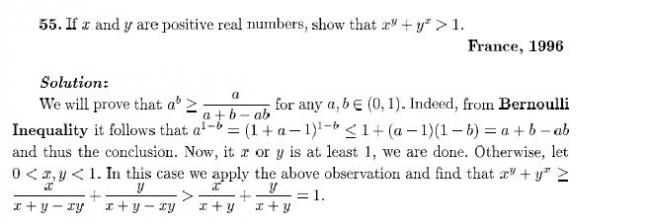Is it okay now. Subhodip when you are posting the solution. Kindly post the approach which comes to your mind. Like after seeing the question what first struck your mind and how did you proceed eventually.
10 Answers
Ah Vivek ! I don't have a solution to this...
Edit:@Fahad (below) what is not clear ? x,y in (0,1).
Using the inequality e^{x-1}\ge x, put x=yx to arrive at y^x>1+x\ln y
Now if we put y≥x, then we have y^x>1+x\ln x
Now recall that x^x\ge \left(\frac{1}{e} \right)^{\frac{1}{e}}
So we finally have x^y+y^x>x^y+1+x\ln x
Now since (x,y) belongs to (0,1), there exists some \epsilon \in (0,1) such that x^y\ge \epsilon^{\epsilon}
Thus the inequality boils down to x^y+y^x\ge \epsilon^{\epsilon} +1+x\ln x\ge \left(\frac{1}{e} \right)^ {\left(\frac{1}{e} \right)} +1-\frac{1}{e}>1
Hmmm
but the above solution is unfortunately wrong
The mistake lies in the line ''Now since (x,y) belongs to (0,1), there exists some .... ''
Just take y= 0.8, x= 0.6 (y ≥ x , as desired)
and according to the solution
0.664539806... = 0.60.8 = xy ≥ pp ≥ (1/e)(1/e) > 0. 692
clearly false
A correct way of solving the problem (taken from the book Old and new in inequalities by its authors )
is attached

Ah my fortune lit up this evening [9]
Let's assume f(x)=x^y+y^x with y≥x as assumed before.
f'(x)=yxy-1+yx ln y
Now take two cases: Case 1)
y>\frac{1}{e}
So f'(x)= yx^{y-1}+y^x \ln y>yx^{y-1}-y^x=y(x^{y-1}-y^{x-1})
Now put g(x)=x^{\frac{1}{x-1}} Easy to see this is decreasing (Derivative tests) so f'(x)>0 implying f(x)>f(0)=1
Now second case when
y<\frac{1}{e}
Take f(y)=x^y+y^x so we have f'(y)=xylnx+x.yx-1≤ -xy+x.xy-1=0
So that gives f(y) is decreasing.
f(y)\ge f\left(\frac{1}{e} \right)=x^{\frac{1}{e}}+\frac{1}{e^x}\ge x\left(\frac{1}{e^{x-1}} \right)+\frac{1}{e^x}=\frac{ex+1}{e^x}
Now again as before g(x)=\frac{ex+1}{e^x}
and it's cakewalk to prove g(x)\ge g(0)=1
Job done "fortunately enough".